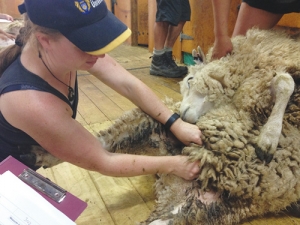Can we predict how long a commercial ewe will last in a flock? Does hogget mating affect longevity? And do high-performing ewes die sooner?
These and similar questions have prompted Massey University sheep researchers Drs Anne Ridler, Paul Kenyon and Rene Corner to EID-tag 12,000 commercially farmed ewe hoggets born in 2010 and 2011, and follow them throughout their lifetimes.
More recently veterinarian Kate Griffiths has taken the project on as a PhD project.
Some of the ewes were mated as hoggets, others were not. While some of those mated were up to 'target' hogget mating weight, others were not. The researchers weighed and body condition scored (BCS) the ewes four times a year, recorded their reproductive performance and noted the reasons for their culling or death.
Funded by the C Alma Baker Trust, the Massey University Research Fund and Beef + Lamb New Zealand, the project is in its fourth year. While it is still too early for final results, clearly an important reason for premature culling is failure to rear a lamb (wet-dry ewes) or culling by the farmers due to perceived poor udders.
Poor or reduced milk production may be contributing to ewes being identified as wet-dry, but there is no data available examining this relationship. Also there are no clear guidelines for udder examination that can assist farmers to decide which ewes to cull based on poor udders.
These factors prompted the researchers to begin an udder study. This year 1200 commercially farmed two-tooth and four-tooth ewes have been EID tagged and they will be examined four times a year (pre-mating, pre-lambing, docking and weaning).
At each visit, BCS and weight will be recorded and each ewe's udder willl be assessed, looking at udder and teat abnormalities, udder size, shape and appearance, and teat size and placement.
The ewes will be bred and managed as usual on a working farm, but at pregnancy scanning in-lamb ewes will have a DNA ear punch sample taken. Any dead lambs will be collected, necropsied and have DNA samples collected.
At docking the live lambs will have DNA samples collected and will be weighed at docking and weaning. This will enable the researchers to assess the influence of udder traits/scores/lesions on lamb survival and growth.
The first assessment was done in January. Results will be released as the study progresses. Meantime, the longevity study also continues and the ewes in that study will be culled for age within the next two years, after which final results can be analysed.



















